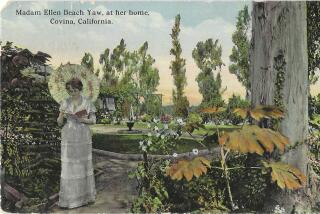AMBASSADOR RECITAL : CAN SUCCESS SPOIL APRILE MILLO?
- Share via
Four years ago, a young, modest, decidedly unglamorous soprano named Aprile Millo ventured an incredibly ambitious recital at Ambassador Auditorium.
Having won a few contests and made a few operatic appearances in relatively obscure places, she attracted a small if appreciative audience. She also served notice of a major talent. That is an understatement.
Sunday night she returned to the scene of her memorable debut. But things weren’t quite the same.
Millo is now a rising star at the Met and a guest in some of the most prestigeous foreign houses. Her first recording, a Verdi-aria collection, is a best seller. Critics--even this curmudgeonly one--have hailed her as a lirico spinto worthy of comparison with the young Leontyne Price.
A full house greeted her this time. Seats had to be set up on the stage and in the orchestra pit to accommodate the overflow audience.
The audience represented a delirious collection of fans and aficionados--the sort that carries on conversations with the soloist, bestows instant standing ovations and offers generous floral tributes.
Under the circumstances, it would be especially gratifying to report that Millo’s promise has been fulfilled, that the diamond in the rough has been polished to perfection. There were some indications, however, that the polishing isn’t being done in the most crucial places.
Millo exuded new-found prima-donna confidence as she strode onstage sporting a modish coiffure, a glitzy black gown and spiky heels. She beamed, waved to her admirers and embarked on what amounted to an elaborately choreographed personal appearance.
She sang beautifully much of the time, but she didn’t just sing. She acted out little operatic dramas, even when such dramas were wildly inappropriate. She sculpted phrases in the air, second-hand Tebaldi style. She struck all-purpose theatrical poses, dipped into a limited repertory of simplistic gestures.
She cozied up to the crook in the piano, strolled to the apron, invariably punctuated high climaxes with a salute to the gods.
When one most wanted her to stand still, to concentrate on acting just with her face and voice, she stooped to the hard sell. When one most wanted her to color the text, point the words, search for inner meanings and subtle nuances, she settled for lazy generalities.
She emoted. She belted. She ignored style differentiation. She went for the obvious effects. Someone must be giving her bad advice.
Has success spoiled Aprile Millo?
Of course not. Not yet, anyway.
She still commands a voice of extraordinary breadth, warmth and richness. She can still sing high and low, loud and soft with uncanny ease, even though one may worry a bit about pitch here and steadiness there. She still has the vocal resources of an old-fashioned operatic paragon, even though she tends make her tone too dark too often.
But she isn’t making the most of her wondrous resources. At least she wasn’t on this disappointing occasion.
In her warm-up group, she sang arias of Gluck, Handel and Paisiello with becoming flexibility and more force than was absolutely necessary. In music of Bellini and Scarlatti she tended to confuse loveliness with charm.
In an obligatory nod to the Lied tradition, she reduced Schubert’s “Nacht und Traeume” to a shimmering legato exercise and blew up Strauss’ “Morgen” to a histrionic tragedy. In Rusalka’s “Song to the Moon,” sung in something akin to Czech, she suggested that the heroine of Dvorak’s opera is more a superwoman than water sprite.
After intermission, Millo soared through the heroic rhetoric of Beethoven’s “Ah! Perfido” as if she were dealing with Puccini’s Turandot. Then, score in hand, she wafted Rossini’s “Regata veneziana” with hypersentimental bravado.
Finally, home at last, she put her passion at the service of Verdi in “Pace, pace, mio Dio.”
At encore time, she told the audience how nice it was to return as a celebrity and dedicated the first ditty, “The Lilac Tree,” to her parents. Then came the slurp of “Musica proibita,” the veristic terra cognita of “La mamma morta” from “Andrea Chenier” and a potential signature piece for both Millo and Aida: “Ritorna vincitor.”
Eugene Kohn provided supportive accompaniments on a less-than-ideally tuned piano.
More to Read
The biggest entertainment stories
Get our big stories about Hollywood, film, television, music, arts, culture and more right in your inbox as soon as they publish.
You may occasionally receive promotional content from the Los Angeles Times.










